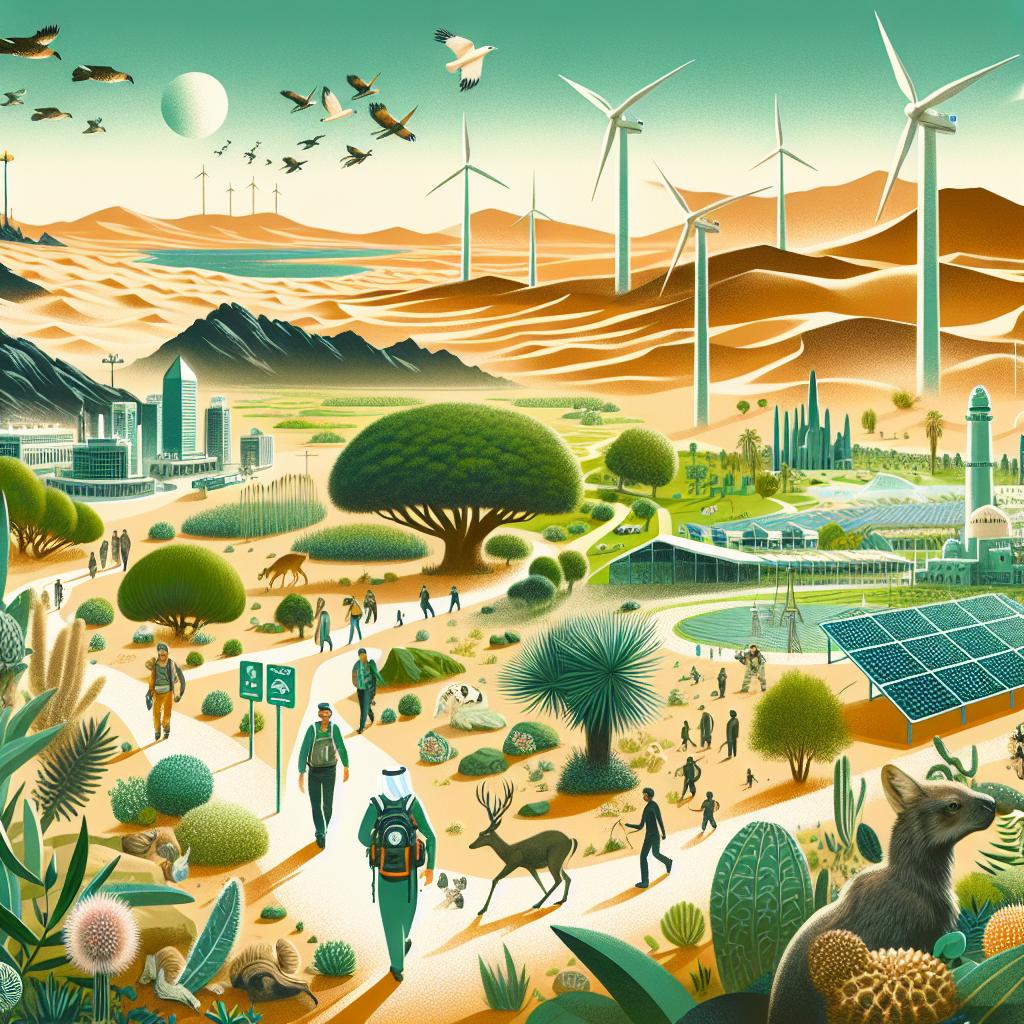Saudi Arabia’s Eco-Friendly Tourism and Environmental Strategies

In recent years, Saudi Arabia has placed significant emphasis on environmental protection, pivoting towards more sustainable practices within its borders. As the nation intensifies its focus on preserving natural landscapes, the burgeoning role of tourism, particularly ecotourism, has emerged as a critical component of these environmental strategies. This article delves into the intricate relationship between Saudi Arabia’s environmental initiatives and the tourism sector, shedding light on how these efforts align with the broader Arab environmental protection strategy. Discover how these initiatives are transforming the Kingdom into a greener destination while contributing to global conservation efforts.
Saudi Arabia’s Environmental Protection Initiatives
Emphasis on Renewable Energy Projects
Saudi Arabia has made significant strides in emphasizing renewable energy projects, particularly focusing on solar and wind power. The nation’s strategic location offers vast potential for solar energy exploitation, resulting in ambitious plans to create some of the world’s largest solar farms. Similarly, wind power projects are being developed, harnessing the kingdom’s geographical advantages to produce clean energy, reduce reliance on fossil fuels, and lower carbon emissions.
Implementation of National Policies
The government of Saudi Arabia has implemented a range of national policies aimed at reducing carbon emissions and promoting sustainability. These policies are aligned with global environmental standards, focusing on cutting greenhouse gas emissions and fostering sustainable industrial practices. Key policy measures include the diversification of the energy portfolio and the promotion of energy efficiency across various sectors.
Large-Scale Conservation Projects
Saudi Arabia has initiated several large-scale conservation projects to protect its unique ecosystems and biodiversity. Notable examples include the creation of protected areas and reserves, such as the Farasan Islands Marine Protected Area, designed to safeguard marine life and habitats. These initiatives not only preserve natural resources but also support the growth of ecotourism by providing pristine natural attractions for visitors while maintaining ecological balance.
The Role of Ecotourism in Environmental Protection
Definition and Principles of Ecotourism
Ecotourism refers to responsible travel practices that conserve the environment, respect local cultures, and promote sustainable development. The core principles of ecotourism include minimizing impact, building environmental and cultural awareness, and providing positive experiences for both visitors and hosts.
How Ecotourism Promotes Conservation Through Education and Awareness
Ecotourism fosters conservation by educating tourists about the importance of protecting natural and cultural heritage. It raises awareness about environmental issues, encouraging travelers to adopt eco-friendly habits during and after their trips. This educational aspect plays a critical role in spreading conservation values globally.
Examples of Successful Ecotourism Projects in Saudi Arabia
Saudi Arabia has embarked on several ecotourism projects that highlight its commitment to environmental protection. Initiatives like the development of the Red Sea Project aim to offer sustainable luxury travel experiences while preserving ecosystems. Another example is the AlUla initiative, which focuses on conserving the area’s natural beauty and cultural heritage by promoting environmentally conscious tourism practices.
Saudi Arabia’s Tourism Strategy
Overview of Vision 2030 and Its Objectives for Tourism
Saudi Arabia’s Vision 2030 is a comprehensive plan to diversify the economy, reduce dependency on oil, and enhance various sectors, including tourism. A key objective is to increase tourism’s GDP contribution from 3% to 10% by 2030. This ambitious goal includes attracting 100 million visitors annually by developing tourist-friendly policies and facilities.
Strategic Investments in Infrastructure and Heritage Site Conservation
Significant financial resources are being allocated to expand tourist infrastructure. This includes modernizing airports, enhancing transportation networks, and building sustainable accommodations. Additionally, there is a strong focus on conserving and showcasing the kingdom’s rich heritage sites, such as Diriyah and AlUla, through careful restoration and sustainable visitor programs.
Targeting Sustainable Development and Minimizing Ecological Footprints
Saudi Arabia is committed to ensuring that its tourism expansion does not come at the expense of the environment. Strategies are being developed to minimize ecological impacts through sustainable practices, such as eco-friendly architecture and responsible resource management in tourism development. This approach aims to protect natural landscapes and cultural heritage while promoting economic growth.
Protective Impacts of Tourism on the Environment
Encouragement of Sustainable Practices within the Tourism Industry
In Saudi Arabia, the tourism industry is steadily adopting sustainable practices to minimize its ecological footprint. Many hotels and resorts are integrating eco-friendly solutions, such as water conservation systems and energy-efficient lighting, to reduce waste and emissions.
Financial Benefits from Tourism Reinvested into Conservation Efforts
The revenue generated by tourism is not just a boon for the economy, but also a significant driver of environmental conservation. Funds are allocated to support wildlife protection, restore natural habitats, and preserve biodiversity, ensuring a sustainable tourism model that benefits both the environment and local communities.
Case Studies of Tourism Projects that Have Helped Preserve Natural Landscapes
Examples of successful tourism projects abound in Saudi Arabia, such as the Asir National Park initiative, which combines tourist access with habitat protection, proving that tourism and environmental preservation can coexist. These projects highlight the dual role of tourism as an economic catalyst and a protector of natural landscapes, promoting a healthier environment for future generations.
Assessing Saudi Arabia’s Environmental Friendliness
Current Achievements and Challenges in Becoming Environmentally Friendly
Saudi Arabia has made significant strides in advancing its environmental protection agenda. The country has successfully launched various renewable energy projects, including the development of large solar farms such as the Sakaka solar power project. Despite these strides, challenges persist, particularly in balancing rapid industrialization with sustainable practices. The nation’s heavy reliance on oil exports remains a significant barrier to reducing carbon emissions and achieving climate goals.
Comparison with Global Environmental Standards and Targets
When compared to global environmental standards, Saudi Arabia faces a unique set of challenges and opportunities. While the country’s Vision 2030 aligns with many international commitments toward sustainability, the pace of compliance with the Paris Agreement targets could improve. Collaborations and partnerships with environmental organizations can bolster the nation’s progress in aligning with global benchmarks for eco-friendliness.
Public and Governmental Attitudes Towards Environmental Sustainability
Public awareness of environmental issues within Saudi Arabia is growing, supported by government campaigns and educational initiatives. Both governmental and non-governmental organizations are playing a key role in promoting sustainability and advocating for green living practices. A shift in attitude towards embracing renewable energy solutions signifies a positive trend, but continuous engagement and education are critical to sustaining momentum in environmental reforms.
The Arab Environmental Protection Strategy
Collective Efforts Within the Arab Region
The Arab region has recognized the significance of environmental protection and has initiated collective efforts to tackle these challenges collaboratively. By establishing regional frameworks, countries aim to address shared concerns such as water scarcity, desertification, and air pollution. These initiatives are designed to foster collaboration and innovation across borders.
Key Goals and Initiatives
Key goals of the Arab Environmental Protection Strategy include promoting sustainable resource management, enhancing ecological conservation efforts, and implementing region-wide policies that address common environmental threats. Initiatives such as the Arab Countries Action Plan emphasize the importance of renewable energy adoption, pollution reduction, and the protection of biodiversity hotspots.
Saudi Arabia’s Role and Contributions
Saudi Arabia plays a crucial role in this regional strategy by leveraging its resources and expertise to spearhead environmental initiatives. The kingdom has made significant investments in research and technology to support sustainable practices, aligning itself with global environmental goals. Saudi Arabia’s participation in regional projects and collaborations helps enhance the collective impact of the Arab Environmental Protection Strategy, showcasing its commitment to a greener and more sustainable future for the entire region.
Conclusion
Saudi Arabia has made significant strides in environmental protection by integrating ecotourism into its broader sustainability strategies. Through initiatives like Vision 2030, the kingdom is demonstrating a commitment to sustainable tourism development, focusing on renewable energy and reducing carbon footprints. These efforts are not only pivotal for the country’s ecological health but also set a benchmark for other nations in the Arab region.
The long-term impacts of these initiatives are promising. Increased awareness and participation in ecotourism can lead to greater environmental stewardship among citizens and visitors alike. Moreover, Saudi Arabia’s role in the Arab Environmental Protection Strategy highlights its commitment to regional cooperation in tackling ecological challenges.
In conclusion, while the path to comprehensive environmental sustainability is ongoing, Saudi Arabia’s focused approach on ecotourism and environmental protection offers a promising outlook for the future. Continued dedication and further strategic efforts will be essential to ensure lasting positive impacts on the environment.
Saudi Arabia’s environmental protection efforts, intertwined with the strategic role of tourism, showcase the nation’s commitment to a more sustainable future. From pioneering renewable energy projects and enforcing policies to curb carbon emissions, to investing in ecotourism that educates and promotes conservation, Saudi Arabia is paving the way for significant environmental progress. Through Vision 2030, the focus on sustainable tourism not only minimizes ecological impacts but also reinvests profits back into conservation, boosting both the economy and the environment. While challenges remain, Saudi Arabia’s contributions to the broader Arab environmental strategy highlight its dedication to cross-border ecological resilience and sustainability.
Now’s the time to support and engage with Saudi Arabia’s environmental journey. Share your thoughts and experiences in the comments below! 💬 Whether you’re an avid traveler or an environmental enthusiast, your insights can spark meaningful discussions and inspire more eco-friendly endeavors.
Explore more on how tourism intertwines with environmental conservancy by diving into our related articles and subscribing to our newsletter for ongoing updates on eco-initiatives. Together, let’s champion a greener future! 🌍🌿

Similar Posts